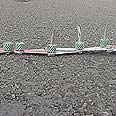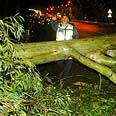


According to one of the most extreme Gaza Strip and northern West Bank evacuation scenarios, hundreds of settlers and their children may entrench themselves in fortified strongholds and threaten to perform mass suicide, Yedioth Ahronoth reports.
Police are preparing for every possible disengagement scenario. The list of case scenarios appears in a secret document which was presented to Defense Minister Shaul Mofaz last week by Israel Police.
However, the document does not state the scenarios would actually occur.
It reveals that police believe settlers would in fact resist
evacuation despite previous optimistic estimations that most settlers would leave their homes before evacuation would begin.
The document also says police aspire to shorten the duration of the evacuation to four weeks in Gaza and one week in the West Bank, despite the initial plan to carry out the evacuation within eight weeks.
The following are excerpts from the document:
Basic assumptions:
• Most settlers would not evacuate willingly and are expected to resist the evacuation.
• The evacuation would be carried out without an agreement with the Palestinians.
• Anti-disengagement demonstrations are expected to be held ahead of the pullout; incitement against public figures associated with the disengagement is expected to escalate.
• Before and during the evacuation, disengagement opponents would back settlers.
• The different settlements are expected to back each other.
• Clashes along the settlement roads are expected.
• Incidents whereby evacuation opponents may harm themselves or others are possible.
• Extreme cases of gunfire at evacuation forces are possible.
• Extreme acts against public figures and senior IDF and Palestinian officers to obstruct the evacuation are possible.
Threatening scenarios:
Passive resistance
• Obstructing the evacuation in a non-violent manner (hundreds or thousands of settlers may lay on the ground tied together in ropes or chains).
• Blocking of settlements’ entry gates.
• Placing spikes on roads, piling dirt, cutting down trees and digging ditches along the sides of roads, and burning tires.
• Operating a communal loud-speaker service, releasing
dogs throughout settlements, flooding areas.
Violent resistance
• Disrupting the evacuation with physical and violent force, such as resisting evacuators by kicking, biting, and punching.
Barricading
• Dozens of residents would lock themselves in their homes, barricading their windows and doors and placing barbed wire around their homes.
• Settlers are expected to physically attack those who attempt to enter their homes to evacuate them.
Violent barricading
• Organizing gatherings on rooftops or inside public buildings, such as bomb shelters or synagogues, with hundreds of residents armed with stones, hot oil and paint to attack evacuators.
• Throwing ladders, cages and physically pushing those who attempt to enter these fortified places of gathering.
• Slashing tires of buses and vandalizing engineering equipment.
Extreme situations
• Unauthorized persons, such as settlers and civilians would create life-threatening situations by barricading a single home or violent gatherings.
• An individual or group would threaten to harm themselves by shooting, setting off an explosion or by opening a gas tank.
• An individual or group would cause harm from inside by shooting, setting off an explosion or by hurling Molotov cocktails.















